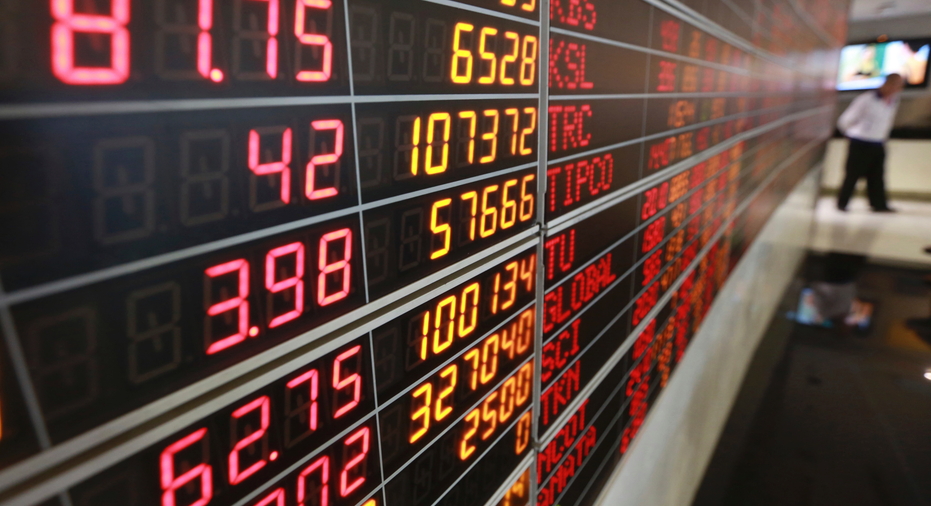Markets Right Now: Futures markets predict more US selling

NEW YORK – The latest on developments in financial markets (all times local):
6:55 a.m.
It's going to be a nervous opening on Wall Street, a day after the Dow Jones industrial average recorded its biggest fall, in percentage terms, since August 2011.
Futures markets are turning cagey as the opening bell gets nearer, with Dow futures and the broader S&P futures, down a further 1 percent and 0.6 percent, respectively.
Stock markets around the world, particularly on Wall Street, have tumbled this week as fears over prospective U.S. interest rate hikes combined with fears that markets were a bit frothy following a strong run over the past year that saw many indexes hit record highs.
Neil Wilson, senior market analyst at ETX Capital in London, is worried about the role technology is playing in the rout. Algorithmic trading, which involves computers following a program, are, he said, "battering the key levels forcing the market lower each time.
As a result, he reckons buyers are being caught out: "So far every time dip buyers come in they are being blown away — despite the fact that on a forward earnings basis stocks are looking more and more appealing."
___
6:30 a.m.
For many stock investors, the rout in markets is likely to have come as a bit of a shock or at least a timely reminder that share prices can go down as well as up.
Throughout the history of financial markets, corrections whereby indexes lose 10 percent of their value have been a regular and healthy phenomenon as they shake out some of the more speculative players and bring share prices back to their fundamental levels.
Craig Erlam, senior market analyst at OANDA, notes that the rally over the last couple of years has been "very strong and without any corrections of note."
As a result, he thinks that it's entirely possible that this has led to some "complacency," with investors perhaps "getting a little ahead of themselves."
___
6:15 a.m.
In the Middle East, stocks were touched by the U.S. and Asian markets' sell-off, though the losses were more limited.
Dubai's stock market closed 1.5 percent lower and Abu Dhabi's shed nearly 1 percent on Tuesday in the region's third day of trading for the week.
In Saudi Arabia, the region's biggest economy, the Tadawul stock exchange slipped 1.5 percent while Qatar's closed a little more than 2 percent down.
Meanwhile, in Egypt, one of the largest consumer markets in the region, the EGX30 was trading 2 percent lower and the EGX50 was down 3 percent.
___
5:45 a.m.
The turmoil in global stock markets has echoes with what's been going on with bitcoin, the hugely volatile virtual currency, which rose exponentially to around $20,000 last year before a precipitous slump.
Many in the markets think assets like bitcoin are introducing a layer of uncertainty that has contributed to the retreat in stocks.
On Monday, bitcoin slid from around $11,500 to below $7,000, while the Dow Jones industrial average fell by a record 1,175 points.
According to James Hughes, chief market analyst at AXI Trader, the Dow Jones "was trying to do its best Bitcoin impression."
Bitcoin was under pressure again Tuesday, trading 5.9 percent lower at $6,509.
___
5:05 a.m.
There are signs of a reprieve in the global market sell-off.
Futures markets are pointing to a steady opening on Wall Street, with Dow futures and the broader S&P 500 futures down 0.2 percent and up 0.4 percent, respectively.
Hopes that Tuesday won't see a repeat of the previous day's selling on Wall Street has helped European stock markets clamber off earlier lows. The FTSE 100 index of leading British shares was down 1.8 percent, while Germany's DAX was 1.9 percent lower — both indexes are higher than where they started the session.
Chris Beauchamp, chief market analyst at IG, said it's the "speed of the correction, not its size," that has proven the "real shock, particularly to a market inured to low volatility."
___
3:15 a.m.
Stock markets in Europe have tumbled at the open following the routs on Wall Street and Asia and as investors fret that a healthy correction could turn into a protracted bear market.
Minutes after the bell to signal the start of trading, the FTSE 100 index of leading British shares was down 2.5 percent at 7,151, while the CAC 40 in France slid 3 percent to 5,127. It was a similar story on Germany's DAX, which was 3 percent lower at 12,308.
Investors around the world have taken fright at the prospect of a higher than anticipated increase in U.S. interest rates this year in the event rising wages stir inflation.
Many in the markets had been anticipating some sort of correction following the steady gains over the past year or so, which have pushed some indexes, notably on Wall Street, to a series of record highs.
___
1:15 a.m.
Shares are taking a beating in Asia after the biggest drop in the Dow Jones industrial average in six and a half years.
Japan's Nikkei 225 index plunged as much as 7.1 percent but recovered some of those losses to close down 4.7 percent at 21,610.24 on Tuesday.
Hong Kong's Hang Seng index fell 4.1 percent to 30,938.85 and the Kospi in South Korea lost 1.4 percent to 2,458.06.
Most other regional share benchmarks gave up between 2 percent to 4 percent. The dollar weakened to 108.81 Japanese yen.



















